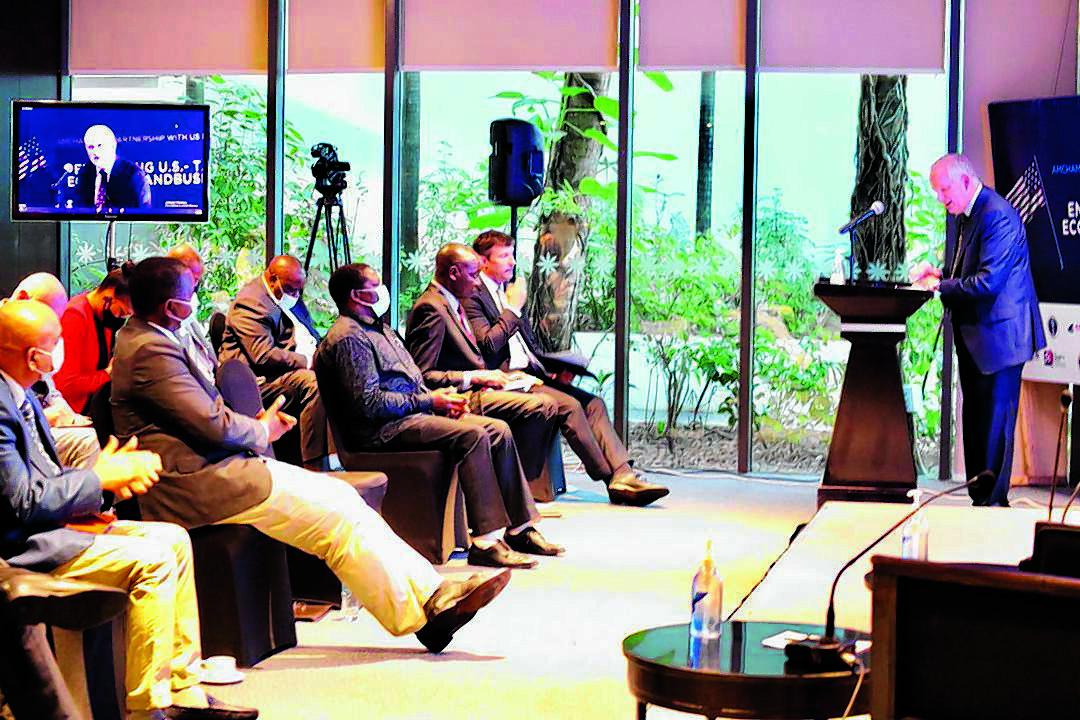Africa-Press – Tanzania. Dar es Salaam.
Tanzania has the potential to attract more investors – but provided that it addresses the existing barriers to investment and trade – and maintain consistency in improving the business environment.
This was said yesterday by foreign investors during the US-Tanzania forum organised by the American Chamber of Commerce in Tanzania (AmchamTanzania) in conjunction with the US Embassy and the US Commercial Services. Lonagro Tanzania Ltd country manager Kashyap Godavarthi said Tanzania had a lot of opportunities that could give investors every reason to come very confidently for safe and secure investment.
In the early days of the leadership of President Samia Suluhu Hassan, he said, investors have already started seeing the changes following her political will in creating a fair taxation system and policy predictability. The government has already scrapped some 232 nuisance taxes and charges that were hampering businesses and investments.
New policies have also facilitated a cut in red tape when it comes to the issuance of work permits and increase in regulatory bodies’ efficiency.
With the online work permit application system, if all documents are intact, an applicant can get a permit within a day compared to the previous 14 days. “Investors thinking of where to invest in Africa, Tanzania in particular, is the best destination,” noted Mr Godavarthi.
However, he said the government needed to work on delays in clearing agricultural equipment at the Dar es Salaam port, as this takes up to two weeks.
“This adds to operational costs due to demurrage charges as well as time and at the end, it is the customer who has to bear the cost burden,” cautioned Mr Godavarthi. Mr Thomas Yongo of the Bechtel-BNT Construction and Engineering commended President Hassan for her efforts in creating a welcoming business environment.
He said it was a good that the government had noted the importance of working closely with the private sector in identifying priorities of investment and charting a way forward for challenges that they are grappling with. “We are looking forward to looking for more opportunities that will help Tanzania come out of the effects of the pandemic,” said Mr Yongo.
Tanzania’s economy grew by 4.8 percent last year, against a projection of 5.6 percent due to the Covid-19 pandemic.
Mr David Porte from the International SBA Communications said changes in regulations in favour of investors would be a way to go if the country was to attract more investors. “I commend what Tanzania has done in improving the business environment. We hope Tanzania will maintain the momentum,” he said.
Shell Exploration and Production-Tanzania vice president and country chair Jared Kuehl noted that there was a need to energise the cooperation between the government and private sector so as to explore the available opportunities in energy transition.
Recognising that the time to invest in the sector is now, the government was working on fiscal, regulatory and legal elements to ensure that the projects were executed smoothly, he applauded.
“The move is very positive, and we hope the government will continue to do so,” Mr Kuehl exuded optimism.
The executive director of International Sales at the Boeing Commercial Airoplanes, Mr Ahsen Rajput, said “We hope more will be done to improve the business environment.”
The US envoy to Tanzania, Donald Wright, commended President Hassan and her administration for seeking to improve the business climate to attract US investments.
He said the private sector was the engine for broad-based economic growth and the reforms by the government will help the private sector to thrive. “My message to American investors is that it is time to re-visit Tanzania as a place to invest in and conduct business,” he said.
He said US firms were also reacting positively. A recent poll by the Embassy found that 61 percent of the firms operating in Tanzania report a “positive” to “very positive” outlook of the Tanzanian market as opposed to just 14 percent of firms with a negative outlook.
Investment minister Geoffrey Mwambe said the government wants the private sector to lead the economy through the massive investments.
That is why, he explained, the government is committed to improving the business environment through the blueprint that sets the stage for a raft of amendments to laws and regulations governing the conduct of business.
“For the private sector to lead the economy, we need to make reforms not only on paper, but also by action,” said minister Mwambe.
“In ensuring that the government facilitates trade and investment, we are doing all in our power to ensure that all government officials sing the same song.”
Agriculture minister Adolf Mkenda said Tanzania is the best destination for investment on the ground that it is endowed with business security, macroeconomic stability, good infrastructure, economic services and regulatory regime.
“To ensure security in investment, we are trying our level best to create a predictable policy environment in agriculture,” noted Prof Mkenda.
Foreign direct investment has the potential to support recovery by creating jobs and boosting productivity.
To realise this potential, it is critical for the country to have in place the right Foreign Direct Investment (FDI) policies to enhance its competitiveness and give firms the confidence to invest.







